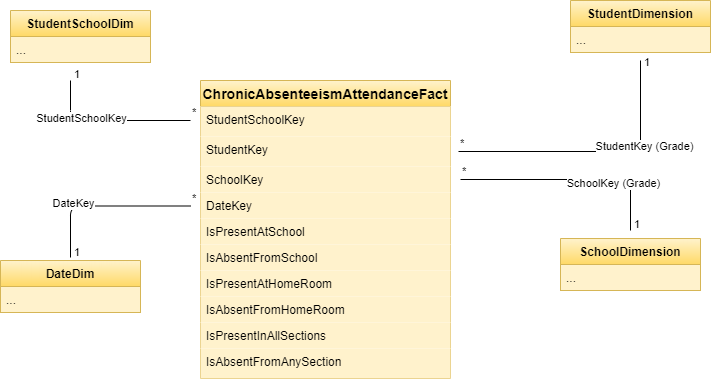Chronic Absenteeism Collection
Introduction
"Students who are chronically absent—meaning they miss at least 15 days of school in a year—are at serious risk of falling behind in school. Yet, for too long, this crisis in our nation's public elementary and secondary schools has not been fully understood."
From the introduction to CHRONIC ABSENTEEISM IN THE NATION'S SCHOOLS: A hidden educational crisis by the U.S. Department of Education.
Views in this Collection
Installation
Install using the option code "CHRAB"
|
For more information, see the AMT Deployment Guide.
Functional Vision
A new use case, Chronic Absenteeism or "chrab", will expand the Analytics Middle Tier Enhancements by providing one or more views that facilitate exploration of chronic absenteeism across various demographic perspectives, as available from the Ed-Fi ODS database.
As noted in the quotation above, "chronic absenteeism" will be defined as missing at least 15 days of school in a year, whether through an excused or unexcused absence. An early warning can be signaled during the year by looking at the percentage of absences relative to number of instructional days: for example if the school calendar has 180 instructional days, then a student could be flagged with a warning at any time if attendance falls below 92% (that is, (180-15/180)). In keeping with the spirit of the Analytics Middle Tier, the views provided will not calculate attendance rate or determine chronic absenteeism in and of themselves: rather, they will make the raw data more accessible, facilitating the ability of education agency data analysts to implement locally defined algorithms.
Although there are similarities with the Early Warning System views, this Chronic Absenteeism use case will provide different shapes to the data and may provide additional demographic information that were not relevant to the Balfanz-model of early warning for potential high school dropout.
Example Queries
This sample query assumes the Texas model of counting attendance by home room, and it assumes that attendance is being handle "negatively": that is, a student is assumed present unless marked as absent.
with aggr as (
select
StudentKey,
SchoolKey,
count(1) as DaysEnrolled,
sum(IsAbsentFromHomeRoom) as DaysAbsent,
from
analytics.chrab_AttendanceFact
group by
StudentKey,
SchoolKey
)
select
(DaysEnrolled - DaysAbsent) / DaysEnrolled as AttendanceRate
from
aggr
select
DateDim.DateKey,
Attendance.StudentKey,
Attendance.SchoolKey,
(Attendance.DaysEnrolled - Attendance.DaysAbsent) / Attendance.DaysEnrolled as AttendanceRateToDate
from
analytics.DateDim
outer apply (
select
StudentKey,
SchoolKey,
count(1) as DaysEnrolled,
sum(IsAbsentFromHomeRoom) as DaysAbsent
from
analytics.chrab_AttendanceFact
where
chrab_AttendanceFact.DateKey < DateDim.DateKey
group by
StudentKey,
SchoolKey
) as Attendance
